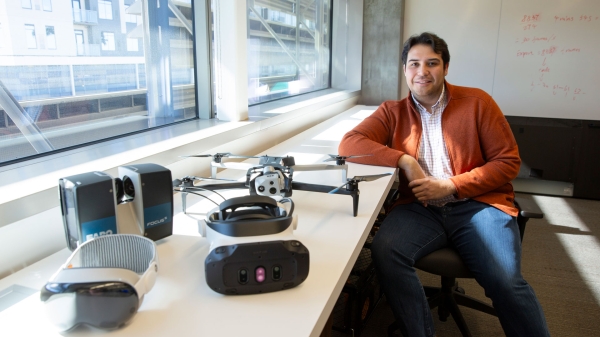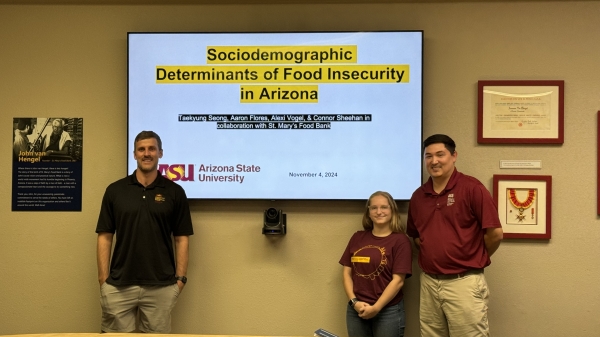Study: Religious and moral beliefs predict what foods people buy
Researchers from Arizona State University, the University of Wyoming and Oklahoma State University have identified moral beliefs that affect food choices. Photo by Raw Pixel on Unsplash.com
Wanting to lose weight or get the best deal are not the only influences on what people buy at the grocery store: Religious and moral beliefs also impact the food choices people make.
Researchers from Arizona State University, the University of Wyoming and Oklahoma State University have identified moral beliefs that affect food choices of religious and nonreligious people. The study is currently available online and will appear in the February edition of the Journal of Business Research.
“Often, people make intuitive decisions about food that could require more careful thought,” said ASU’s Kathryn Johnson, assistant research professor of psychology. “People might make choices based on a cultural narrative or their religious and moral beliefs, without giving measured thought to whether there is a better option.”
What people value affects what foods they buy
In a series of four experiments, the research team tested the influence of religiosity, or how generally religious a person is, on the foods people choose to buy and eat. The researchers also looked at which moral beliefs were behind food choices. The study was carried out online and included responses from over 1,700 people across the United States.
“Religion is the deepest set of core values people can have, and we wanted to explore how those values impacted the market choices people make,” said Elizabeth Minton, associate professor of marketing at the University of Wyoming and lead author on the study.
The team compared two types of foods, which they labeled diet-minded and sustainably-minded foods. The diet-minded food group included fat-free, sugar-free or gluten-free foods, and the sustainability-minded group included natural or organic foods.
The first experiment looked at how religiosity affected food choice. The participants were asked questions to gauge how religious they were and then answered a question about whether they would purchase a fruit cup. For half of the participants, the fruit cup was described as organic and for the other half as gluten-free.
People who were very religious had less favorable attitudes toward the organic fruit cup and were more likely to say they would buy a gluten-free version. This finding was expected based on two previous studies that reported a social explanation for why highly-religious consumers did not purchase sustainably-minded foods: They did not want to be associated with groups that prioritized environmental issues. The research team wanted to understand what moral beliefs might also be driving this relationship.
“People have different moral intuitions, or moral foundations,” Johnson said. “Some people might be motivated to avoid harming others, including animals, while others might be driven by loyalty to their group or avoiding pathogens.”
A moral perspective on consumer choice
The team used the moral foundations theory to test which moral beliefs influenced food preferences for religious and nonreligious people. The theory categorizes moral beliefs into five main typesThe five moral foundations are care, purity or sanctity, fairness or proportionality, loyalty or in-group,and authority or respect. . The team focused on the moral foundations of “care” and “purity.” Care includes feelings of empathy and compassion toward others and has been linked to environmentalism. Purity is linked to attendance at religious services, cleanliness and self-discipline.
A second experiment tested for a link between moral foundations and food preferences, and the third experiment was a replication of the second. In these two experiments, the participants answered questions about how religious they were and also completed a survey that measured which moral foundations they valued most. They answered a series of questions about what kinds of foods they preferred.
Again, high levels of religiosity were linked to people reporting they preferred diet-minded foods more than sustainably-minded foods. The team found this preference was driven by the moral foundation of purity. Though the team expected high religiosity to have the opposite relationship with sustainably-minded foods — that religious people would avoid organic and natural foods — they found it was not related at all.
The final experiment tested how different moral foundations influenced what kind of foods people might actually buy. After answering questions about religiosity and moral foundations, the participants indicated whether they would buy a food that was gluten-free, allergen-free or organic. The team found that the moral foundation of care was driving the choice of a sustainably-minded food, and the moral foundation of purity was behind the choice of a diet-minded food.
“We found religiosity influenced the selection of more diet-minded foods, which suggests the motives for consuming gluten-free or fat-free foods might not be the same as natural and organic foods,” Minton said. “Many people make decisions about food unknowingly, and it is important when trying to increase healthy choices that people are aware of what influences their decisions.”
The findings from the study also have implications for how businesses market food to consumers.
“The findings from our work can directly help businesses promote food products to specific groups of people without potentially alienating customers by including religion,” said Richie Liu, assistant professor in the school of marketing and international business at Oklahoma State University and senior author on the paper.
More Science and technology

Teaching construction realities with virtual environments
Visiting a construction site is a valuable learning opportunity for students who want to one day work in the industry.…
ASU, Mexico partner to build next generation of chipmakers, drive semiconductor innovation
Thousands of college students in Mexico will soon have the opportunity to enroll in Arizona State University’s new, free online…

ASU, St. Mary’s Food Bank partner to tackle food insecurity in Arizona
Arizona State University and St. Mary’s Food Bank (SMFB) have joined forces to create an interactive data dashboard that tracks…